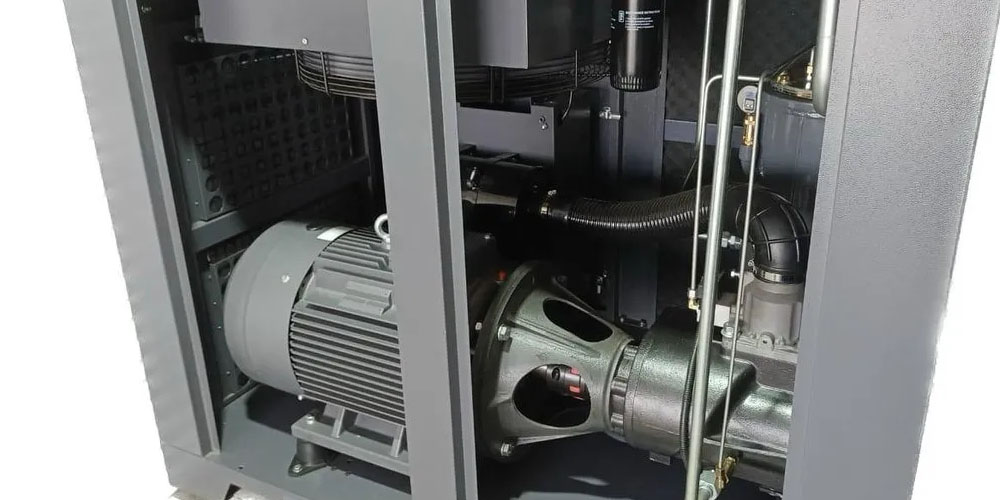Traditional air compressors have a fixed speed, which means they operate at a certain pace all the time. This generates a set quantity of compressed air each minute. If your compressed air requirement is balanced and unvarying, the fixed-speed compressor technique has multiple benefits.
Additionally, fixed speed operates without any load because an engine start-up would impose strain on the motor. Energy may be wasted since no compressed air is being produced by the machine, which is running. This problem is avoided by variable speed compressors, which adjust their output to the level of demand. Simply by creating the
Screw compressors with fixed frequencies are long-lasting and capable of delivering consistent performance for many years. A number of variable, including the level of maintenance and the working environment, will affect the compressor’s lifespan. A fixed-frequency screw compressor can run for more than 10 years with the right maintenance and care.
Key Features of Fixed Compressor
The advantages and characteristics of a screw air compressor with fixed frequency are explained in the sections that follow a few the primary points:
Efficiency
The screw air compressor with set frequency incorporates energy-efficient innovations to change its speed in accordance with air demand you, enabling you to conserve cash for energy expenses while providing more airflow in fewer seconds.
Simple to Use
You could simply alter temperature, pressure, and airflow with just a click of a button when employing an advanced control system.
Reliability
The compressor is powerful, durable, and reputable because it has been built with superior components and manufacturing techniques.
Versatility
Since it is capable of compressing a variety of gasses, the compressor makes sense for a range of industries, notably production, medical, food, and chemical. An effective, trustworthy, and simple-to-use device, a fixed-frequency screw air compressor will assist you to do your work swiftly while conserving money on the cost of energy.
Advantages of Fixed Speed Compressor
Cost of Upfront
The starting expenses of fixed-frequency screw compressors are typically lower because of their simpler designs and the need for fewer components. This makes them a desirable option for companies on a tight budget or for those seeking a simpler solution without the need for sophisticated features.
Energy Conserving
No matter how much air is actually required, fixed-frequency compressors use the same amount of energy because they operate at a set speed. When the need for air fluctuates during the day or week, this might lead to energy waste, which reduces their efficiency.
Need of Maintenance
Due to their simpler design and fewer components, fixed-speed compressors typically require less maintenance. In the long run, this could result in time and resource savings because they might have a lower chance of component failure, need fewer replacement components, and be simpler to maintain.
Scope of Application
Fixed-speed compressors perform best in environments where air demand is constant, such as in factories with predictable production cycles, workshops that operate continuously, or establishments that need a regular supply of air throughout normal business hours.
Level of Noise
Due to their constant motor speed, fixed-frequency compressors tend to generate more noise, which might result in a louder working environment. This might not be the best option for firms that need a quieter environment for their employees or for sites where noise pollution is a concern.
Control Choices
Since they run at a fixed speed, fixed-speed compressors have few control options. They might not be the best choice in instances where air usage varies throughout the day or week because this can make them less adaptable to shifting air demand.
Final Reflections
Variable-speed screw compressors offer improved energy efficiency and versatility while fixed-speed screw compressors offer simplicity and reduced upfront expenses. The optimum option is determined by your unique needs and operating needs. Fixed frequency compressors are less expensive initially and require less maintenance, but they could be less effective and adaptable in terms of control choices and power usage.

